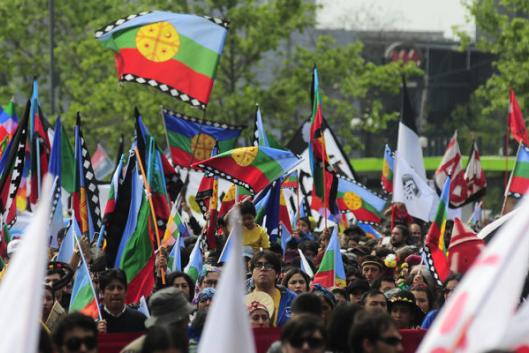Chile is currently debating amendments to Decree Law 701, which was passed during the first years of the military dictatorship and has been used for decades to promote the expansion of large-scale monoculture tree plantations. This expansion is driven by hefty government subsidies, and has been achieved at the expense of the violation of the rights of Mapuche indigenous communities, who have been violently evicted from their lands and left marginalized in their own ancestral territory.
The amendments are aimed at enabling the further expansion of tree plantations onto peasant and indigenous lands, in order to raise the total plantation area from the current 2.6 million hectares to 5.7 million hectares. The government is promoting tree plantations with false promises of the benefits this activity will bring to peasant and indigenous communities. It is estimated that there are two million hectares of land currently under the control of peasant farmers and indigenous people on which tree plantations could be expanded.
But Mapuche communities are all too familiar with the results of decades of policies promoting the spread of this so-called “forestry” activity. Above all, because it is precisely on their lands that this expansion has taken place. Moreover, as a result of this “forestry” model, the municipalities with the largest areas of tree plantations are the poorest in the country, with some of the lowest rankings on the Human Development Index.
The three regions in the south where tree plantation activity is concentrated are the poorest in Chile. The Mapuche have also witnessed the disappearance of native forests, the destruction of water sources, the loss of biodiversity, forced migration to the cities, and the destruction of their culture.
The Mapuche have been struggling to recover their territory for years. As a result, they have faced violent repression and been criminalized when they fight back against the occupation of their lands. Nevertheless, they are not prepared to give up. Today there are numerous ongoing processes of resistance and the reclaiming of ancestral lands.
Lafkenche Mapuche communities in the municipalities of Carahue and Tirúa Sur have initiated one of these processes. A total of 60 families have taken back 2,000 hectares of land that belongs to them and was being illegally occupied, primarily by the plantation company Forestal Mininco, which forms part of one of the most powerful business groups in Chile.
While the families have still not moved into the area recovered to live, as first steps they uprooted newly planted pine trees and then began to fence off and sow the land. They have now planted 300 hectares of crops and the first harvests are expected in February. They have also carried out inspections of the land. This is because, although they are familiar with this territory, they do not know what condition the soil is in, and how productive it is, after so many years of being subjected to chemical spraying by the plantation companies. They first needed to conduct tests to determine if crops were actually able to grow here.
These Mapuche communities have also begun to carry out religious ceremonies called “guillatunes” (1) here on their sacred land. “We have been holding guillatunes and working on planting crops,” they report.
Mininco, which is currently in the process of having its plantations certified by the FSC, does not appear to be prepared to negotiate, nor to recognize that these lands rightfully belong to the Mapuche communities. On the contrary, there have been violent confrontations, and some community members have even been unjustly slapped with criminal charges.
The Mapuche have been accused of setting fires in tree plantations, despite evidence demonstrating that companies have started fires on their own plantations in order to collect the insurance, since the pine trees planted there had been killed and thus rendered unusable by an infestation of wood wasps.
Mapuche communities are rewriting their history. In the words of one of our Mapuche brothers, “We want to go down in history as the ones who recovered our territory.”
(1) The guillatun (also spelled nguillatun) is a Mapuche ceremony that connects our world to the spirit world in order to ask for well-being, to strengthen the unity of the community, or to offer thanks for what has been received. It may be carried out to ask for good weather, for successful sowing and harvests, for good health and an abundance of food, and for physical and spiritual strength. Individual communities carry out these ceremonies periodically, usually at least once a year.
Teresa Pérez, WRM, teresap@wrm.org.uy, based on data obtained during a visit to the region with members of the Chilean organization Observatorio Latinoamericano de Conflictos Ambientales (OLCA), carried out in November 2012.
